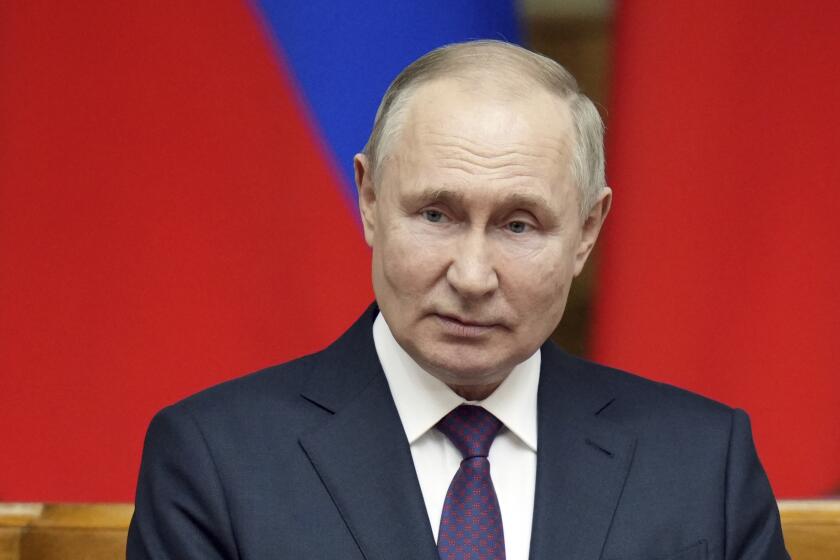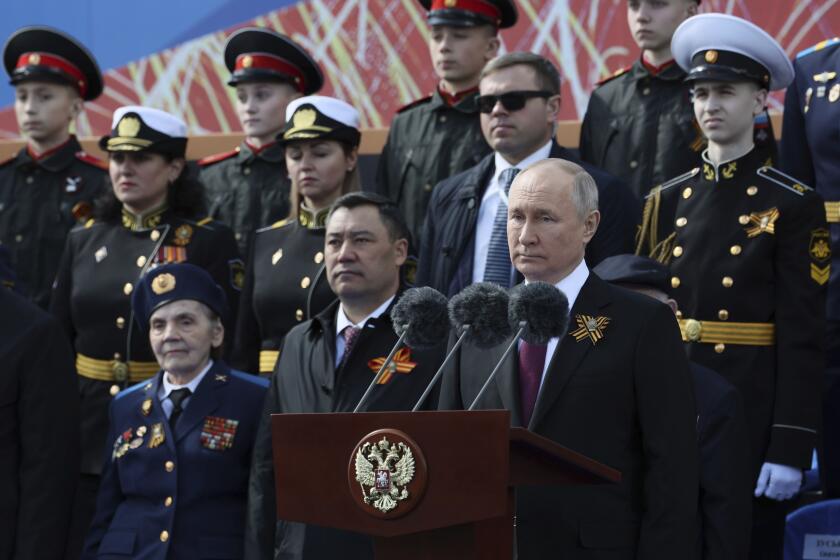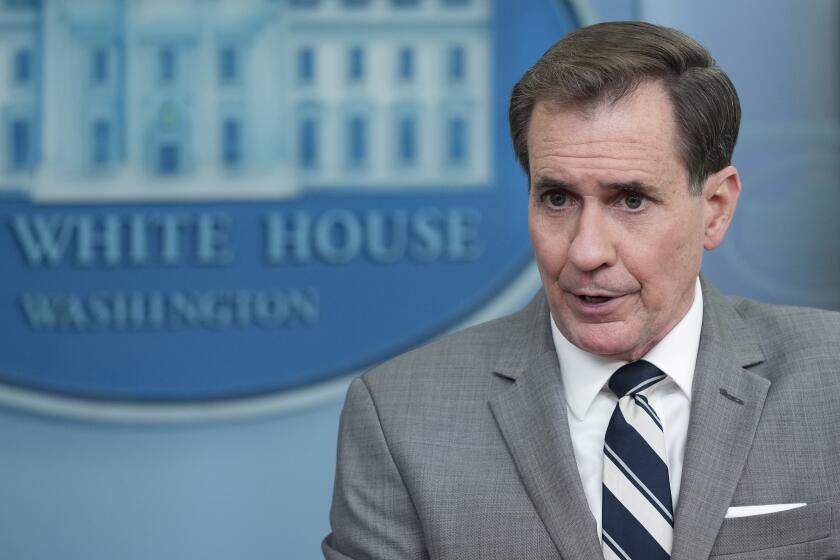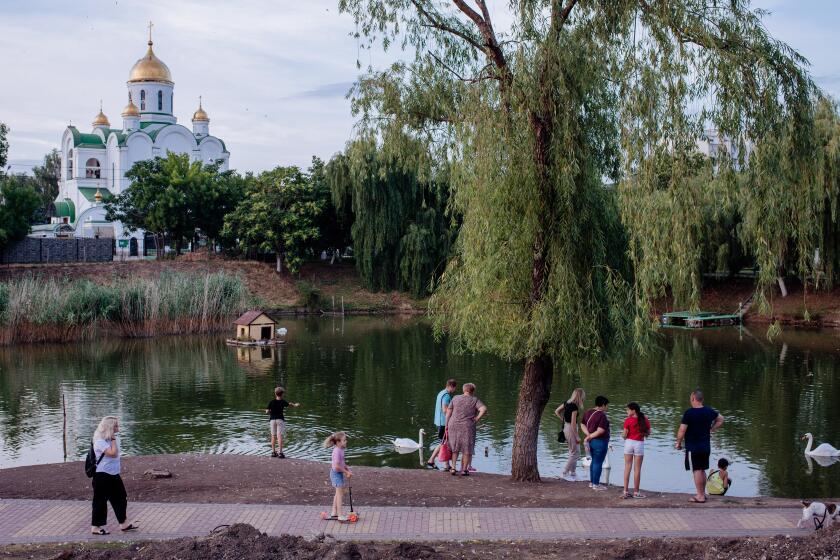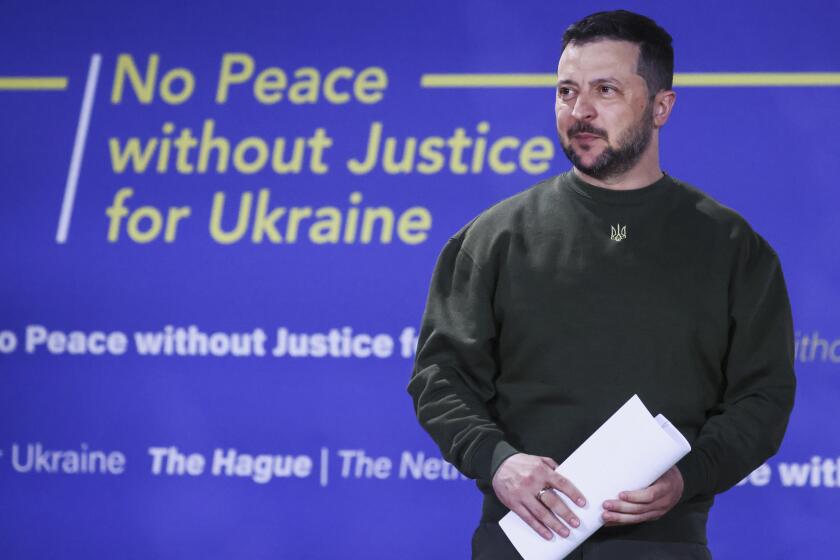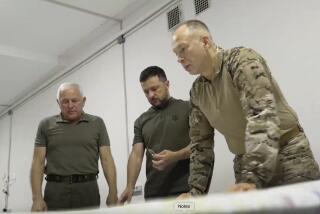Britain gives cruise missiles to Ukraine as Zelensky says counteroffensive needs more time
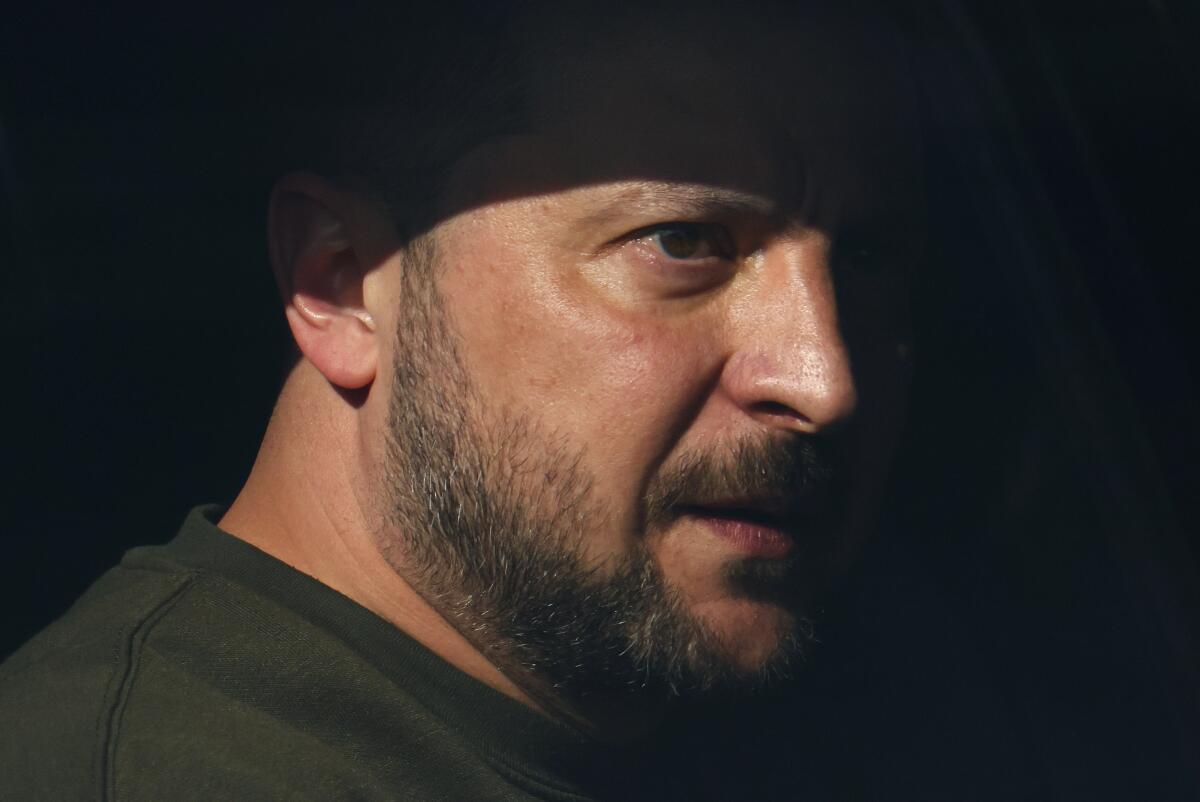
- Share via
KYIV, Ukraine — President Volodymyr Zelensky said in remarks broadcast Thursday that Kyiv is delaying its long-awaited counteroffensive against Russia’s occupying forces because Ukraine lacks enough Western weapons to succeed without suffering too many casualties.
His remarks, in an interview with European broadcasters, were aired shortly before Britain said it had sent Ukraine air-launched cruise missiles that would allow pilots to extend their reach farther than possibly any other weapon in their arsenal, to locations deep behind the front line.
A Ukrainian counteroffensive against Russia’s more than 14-month-old invasion has been expected since warmer weather improved battlefield conditions, and Zelensky said it’s possible that “we can go forward and be successful,” the BBC reported.
“But we’d lose a lot of people. I think that’s unacceptable,” he was quoted as saying. The interview was reportedly carried out in Kyiv with public service broadcasters who are members of Eurovision News, including the BBC.
“So we need to wait. We still need a bit more time,” Zelensky was quoted as saying. “In terms of equipment, not everything has arrived yet.”
Russian authorities increase crackdown on human rights groups, and President Vladimir Putin makes ‘treason’ punishable by life in prison.
Analysts and Ukrainian officials have talked for months of a coming Ukrainian counterpunch. Zelensky’s remarks could be designed to keep the Russians guessing, with more uncertainty because both sides are struggling to secure enough ammunition.
Ukraine’s troops are receiving Western training, as well as advanced weapons, as it gears up for such an assault.
Later Thursday, U.K. Defense Secretary Ben Wallace told lawmakers it sent Ukraine the Storm Shadow missiles, a conventionally armed weapon with a range of more than 150 miles. By contrast, the truck-mounted HIMARS launchers that the United States has supplied feature GPS-guided missiles capable of hitting targets up to 50 miles away.
Wallace said the cruise missiles “are now going into or are in the country itself,” but didn’t say how many were provided.
The air-launched missiles would allow Ukrainian forces to target locations such as Russia-occupied Crimea. Kyiv has pledged not to use them to attack Russia itself, U.K. media reported. The U.S. and its allies have expressed concern that enabling Ukraine to use their weapons to hit targets inside Russia could provoke the Kremlin to escalate the war.
The British delivery adds to the tanks and long-range precision artillery that Western countries have already supplied to Ukraine.
Ben Hodges, a former U.S. Army Europe commanding general, tweeted: “Well done UK!” adding: “This will give Ukraine capability to make Crimea untenable for Russian forces” and would force Russia to reconsider where to position its Black Sea fleet.
Russian President Vladimir Putin addresses his compatriots at a parade in Moscow, saying ‘a real war’ has been unleashed against their country.
Sidharth Kaushal, a research fellow at London’s Royal United Services Institute, said the Storm Shadow missiles could allow Ukraine to strike Russian vessels in its Black Sea headquarters port of Sevastopol, from which Moscow’s Kalibr missiles “have been used to target crucial Ukrainian infrastructure.”
Patrick Bury, senior lecturer in security at the University of Bath, wasn’t surprised at Zelensky’s comments about delaying the spring campaign.
“If you are Zelensky, you are doing everything you can to make sure you get everything you need” before launching the offensive, he said.
“On the other hand, I would not be surprised at all if it started in the next couple of weeks, depending on the mud. ... As of last week, it was still one of the wettest springs they’ve had over there in years. … It’s just not favorable,” Bury added.
A Ukrainian military claim Wednesday that its troops had advanced up to 1.2 miles around the hotly contested eastern city of Bakhmut fueled speculation that the counteroffensive was underway.
Serhii Cherevatyi, spokesman for Ukraine’s Operational Command East, told the Associated Press that the fighting and forward movement was not the “grand counteroffensive, but it’s a harbinger showing that there will be more such attacks in the future.”
But the head of the Russian private military force known as the Wagner Group, which has spearheaded Moscow’s battle for Bakhmut, claimed that the Ukrainian counteroffensive was “in full swing,” with Ukrainian forces advancing “on the flanks” around Bakhmut.
“Unfortunately, in some areas they’re doing it successfully,” Wagner founder Yevgeny Prigozhin said.
The White House estimates that, just since December, Russia has suffered 100,000 casualties, including more than 20,000 killed.
The Kremlin’s forces are deeply entrenched in eastern areas of Ukraine, with layered defensive lines reportedly up to 12 miles deep. Kyiv’s counteroffensive would probably face minefields, antitank ditches and other obstacles.
Russia is “acting slow” in Ukraine because it wants to preserve infrastructure and save lives there, Kremlin spokesman Dmitry Peskov claimed in an interview with the Bosnian Serb channel ATV broadcast Wednesday night.
Moscow has repeatedly explained its lack of advances on the battlefield as an effort to protect civilians, but those claims have been proved false, with frequent attacks on civilian buildings.
Zelensky said Russian President Vladimir Putin is counting on reducing the war to a so-called frozen conflict, with neither side able to dislodge the other, according to the BBC. He ruled out surrendering territory to Russia in return for a peace deal.
The Kremlin wants Kyiv to acknowledge Russian sovereignty over Crimea and to recognize September’s illegal annexation of the provinces of Donetsk, Kherson, Luhansk and Zaporizhzhia. Ukraine has rejected the demands and ruled out any talks with Russia until its troops withdraw from all occupied territories.
Wedged between Moldova and Ukraine, the breakaway republic of Transnistria holds fast to its Russian roots but wants to stay out of the war on Ukraine.
Military analysts have warned that Putin is hoping that the West’s costly support for Kyiv will begin to fray. Ukraine’s Western allies have sent the country$70 billion in military aid, and with no peace talks on the horizon, the alliance is gearing up to send more.
European Union foreign policy chief Josep Borrell said delaying a counteroffensive was a sign that the West must step up its military support for Ukraine.
“Certainly, they need more preparation,” Borrell said at a defense and security conference in Brussels. “They need more arms. They need to gather more capacity, and it is us who have to provide for that.”
Start your day right
Sign up for Essential California for the L.A. Times biggest news, features and recommendations in your inbox six days a week.
You may occasionally receive promotional content from the Los Angeles Times.
Russia also is seeking more weapons and ammunition. The U.S. ambassador to South Africa accused the country Thursday of providing weapons and ammunition to Russia via a cargo ship that docked secretly at a naval base near Cape Town in December. South African President Cyril Ramaphosa said an investigation was underway.
Over the winter, the Ukraine conflict became bogged down in a war of attrition, with both sides relying heavily on bombardment of each other’s positions. A counteroffensive is a major challenge, requiring the Ukrainian military to orchestrate a wide range of capabilities, including providing ammunition, food, medical supplies and spare parts, along potentially extended supply lines. The front line extends more than 600 miles.
Zelensky has been making the rounds of Western capitals to seek more support. As part of that effort, Pope Francis may meet Zelensky at the Vatican this weekend, a Vatican official said Thursday. Francis recently revealed a secret peace “mission” but provided no details. Zelensky was expected in Germany starting Saturday evening. Italian media, citing unidentified sources, reported that Zelensky might be in Rome earlier that day to meet with Prime Minister Giorgia Meloni and the pope.
Russia’s latest long-range barrages killed at least six civilians and wounded 13 more between Thursday and Friday mornings, Ukraine’s presidential office said.
Ukrainian president Zelensky visits International Criminal Court, which issued an arrest warrant for Russian President Vladimir Putin for alleged war crimes.
In other developments, a Ukrainian drone damaged a fuel storage tank across the Russian border in Bryansk, the region’s governor reported on Telegram. In Ukraine’s Russian-occupied city of Melitopol, Russian-appointed authorities reported an assassination attempt against a judge. The authorities didn’t report how the attack occurred, saying only that the judge wasn’t injured, but two of his guards were. Ukraine didn’t comment on either attack.
More to Read
Sign up for Essential California
The most important California stories and recommendations in your inbox every morning.
You may occasionally receive promotional content from the Los Angeles Times.
